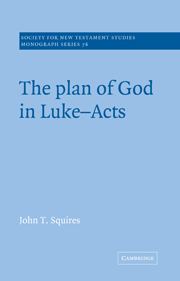Book contents
- Frontmatter
- Contents
- Acknowledgements
- List of abbreviations
- 1 The plan of God in Luke–Acts
- 2 The Programmatic role of providence in hellenistic historiography
- 3 Providence: God at work in human history
- 4 Portents: signs of divine action in human history
- 5 Epiphanies: inspired indications of the plan of God
- 6 Prophecy: foretelling and fulfilling the plan of God
- 7 Fate: the necessity of the plan of God
- 8 Conclusions
- A select bibliography
- Index of Greek words
- Index of subjects and authors
- Index of biblical references
6 - Prophecy: foretelling and fulfilling the plan of God
Published online by Cambridge University Press: 22 September 2009
- Frontmatter
- Contents
- Acknowledgements
- List of abbreviations
- 1 The plan of God in Luke–Acts
- 2 The Programmatic role of providence in hellenistic historiography
- 3 Providence: God at work in human history
- 4 Portents: signs of divine action in human history
- 5 Epiphanies: inspired indications of the plan of God
- 6 Prophecy: foretelling and fulfilling the plan of God
- 7 Fate: the necessity of the plan of God
- 8 Conclusions
- A select bibliography
- Index of Greek words
- Index of subjects and authors
- Index of biblical references
Summary
A frequent emphasis throughout Luke's two volumes is on the way in which certain events, especially the passion of Jesus and the mission to the Gentiles, fulfil the words of the prophets. The story Luke tells is the outworking of these prophecies in human history, in accordance with the plan of God. Such a view of prophecy assumes three things: its predictive nature, the certainty of its being fulfilled and the fundamental assurance of divine guidance which guarantees this. Luke provides a number of instances of predictive prophecies whose fulfilment is possible because God is guiding history.
Although central to Luke's presentation of the plan of God, this perspective is not unique to Luke, for he shares a common view of the nature and function of prophecy. The same three characteristics also appear in the scriptures of the Hebrews, most prominently in the Deuteronomic history, and it has been claimed that these similarities, among others, mean that the Septuagint was actually the primary influence upon Luke's manner of presenting the story of Jesus and the early church. Nevertheless, this view that prophecy entails the utterance of divinely given predictions which come to fulfilment, is not unique to the Deuteronomistic history, for it is widespread throughout the hellenistic world and is to be found in the hellenistic histories which, as we have already seen, reflect other dimensions of Luke–Acts.
- Type
- Chapter
- Information
- The Plan of God in Luke-Acts , pp. 121 - 154Publisher: Cambridge University PressPrint publication year: 1993



